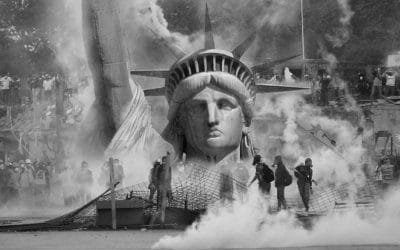Summer vacations are used for many things. Some parents use the long summer vacation from schools and colleges to get their children to read books that are different from the steady diet of a liberal-left view of the world that they get during the school year.
These parents don’t necessarily want an opposite view of the world. Some would be happy with just some books that play it straight when discussing history, economics or politics.
There are many schools, and even prestigious colleges, where students can spend years without getting any history at all. Sad as this is, these students are probably better off than those who get a history that is nothing but a diatribe against everything that Americans have done since landing on these shores.
One of the best histories of the United States is, ironically, by a British historian, Paul Johnson. His book “A History of the American People” is comprehensive and written in the easy-to-read style that has made Paul Johnson’s many books popular in the English-speaking world and have led to their being translated into many other languages around the world.
“A History of the American People” is more than just a survey of what happened in the past. It is a penetrating analysis of why it happened and of the people who made it happen. It is what history should be.
Students who have been led in their schools and colleges to regard the modern welfare state as a wonderful idea can get a radically different view of how it began and what its actual consequences have been by reading four insightful books published in recent years.
“FDR’s Folly” by Jim Powell is a devastating re-examination of the high hopes and disastrous results of the New Deal policies which introduced the welfare state in the United States during the Great Depression of the 1930s.
One example: The enactment of the first federal minimum wage law in 1933 raised the average wage rate in the Southern textile industry by 70 percent — and half a million nationwide blacks lost their jobs. But the welfare state has always been judged by its good intentions, rather than its bad results.
Anyone who wants to understand the social degeneracy of today’s welfare state can find it described and explained with painful frankness and great insight in “Life at the Bottom” by Theodore Dalrymple, a doctor who has spent years working in Britain’s low-income neighborhoods, in hospitals and in prisons.
Dr. Dalrymple’s first-hand account of the behavior, beliefs, and attitudes among the British underclass makes all too clear what the poisonous effects of the welfare state and a “non-judgmental” ideology have been — irresponsible, parasitic and often violent individuals, chaotic families with abused children and a whole society whose standards are eroding away.
What Dalrymple finds in Britain closely parallels what can be found among the American underclass as well. However, since “Life at the Bottom” is about a white underclass overseas, many people here can accept it without fears of being considered racist.
Dalrymple’s latest book, published this year, is titled “Our Culture, What’s Left of It” and now he takes a look at the intellectual and political elite, as well as the underclass that has served as guinea pigs for their social experiments. His account of the smug ignorance of this elite is as chilling as his account of the catastrophic effects of their notions on society.
An American critique of our own welfare state and the political means used to perpetuate it can be found in Mona Charen’s brilliant new book “Do-Gooders.” It carefully examines and explodes some of the political myths used to try to perpetuate liberal policies despite their many failures.
My own new book this year — “Black Rednecks and White Liberals” — gives a very different view of racial and ethnic issues from what students are likely to get in their schools and colleges. Its general thesis is that cultural differences matter, despite the multicultural dogma that all cultures are equal.
Both blacks and whites from a counterproductive culture lag far behind other blacks and whites from a different culture. The effects of cultural differences cut right across racial lines.




